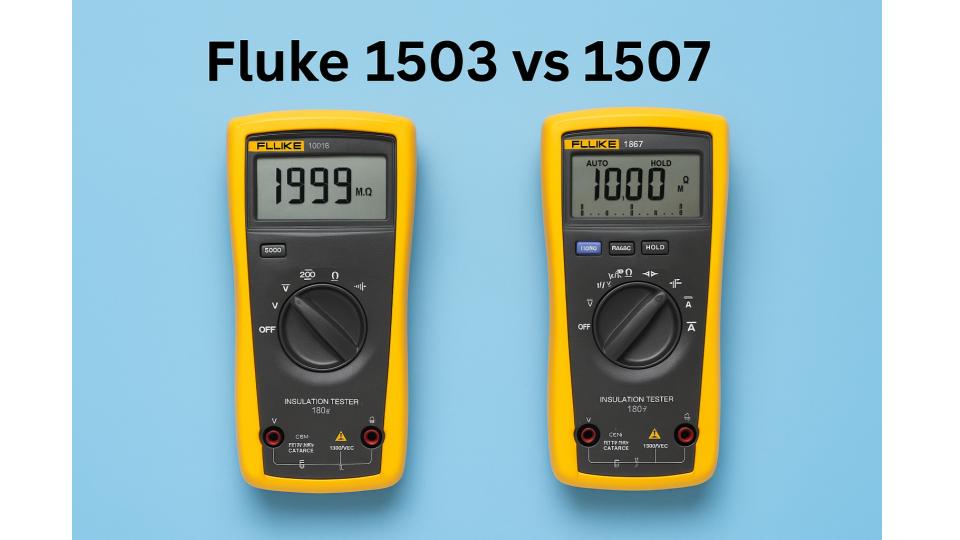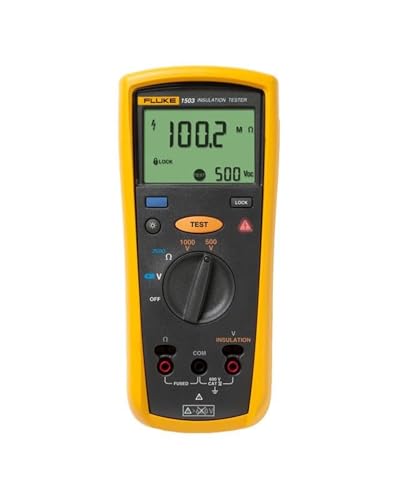When it comes to insulation testers, Fluke has a strong reputation for durability, accuracy, and safety. Two of the most popular models in their lineup are the Fluke 1503 and the Fluke 1507.
🏷️ Fluke Insulation Tester Deals ⭐⭐⭐⭐
At first glance, these meters look very similar, but the 1507 offers more advanced features and flexibility. Let’s break down the details so you can decide which one is best for your work.
📋 Overview of the Fluke 1503
The Fluke 1503 Insulation Tester is a reliable entry-level option designed for electricians and technicians who need a straightforward tool for testing insulation resistance.
Key Features:
- Test voltages: 500 V and 1000 V.
- Insulation resistance range: up to 2000 MΩ.
- Measures continuity with audible buzzer.
- Compact and lightweight design.
- CAT IV 600V / CAT III 1000V safety rated.
Best For: Electricians who need a basic insulation tester for general-purpose testing at a lower cost.
⚡ Overview of the Fluke 1507
The Fluke 1507 Insulation Tester builds on the 1503 by offering more test voltages, higher resistance range, and advanced testing functions.
Key Features:
- Test voltages: 50 V, 100 V, 250 V, 500 V, and 1000 V.
- Insulation resistance range: up to 10 GΩ (much higher than 1503).
- Polarization Index (PI) and Dielectric Absorption Ratio (DAR) testing for advanced diagnostics.
- Remote test probe included for easier one-person operation.
- CAT IV 600V / CAT III 1000V safety rated.
Best For: Professionals who require greater flexibility and advanced diagnostics for insulation testing in industrial and high-voltage environments.
⚖️ Fluke 1503 vs 1507: Side-by-Side
| Feature | Fluke 1503 | Fluke 1507 |
|---|---|---|
| Test Voltages | 500 V, 1000 V | 50 V, 100 V, 250 V, 500 V, 1000 V |
| Max Insulation Resistance | 2000 MΩ | 10 GΩ |
| Continuity Test | ✅ Yes | ✅ Yes |
| PI & DAR Testing | ❌ No | ✅ Yes |
| Remote Probe | ❌ No | ✅ Yes |
| 💳 Pricing | 💲Check Price | 💲Check Price |
| Safety Rating | CAT IV 600V / CAT III 1000V | CAT IV 600V / CAT III 1000V |
| Best For | Basic insulation resistance testing | Advanced diagnostics and flexibility |
✅ Pros and Cons
Fluke 1503
✔ Affordable entry-level insulation tester
✔ Compact and simple to use
✔ CAT IV safety rating
✘ Limited to two test voltages (500 V & 1000 V)
✘ No PI/DAR testing
✘ Lower insulation resistance range
Fluke 1507
✔ Wider range of test voltages
✔ Higher insulation resistance measurement (10 GΩ)
✔ Includes PI and DAR testing for in-depth analysis
✔ Remote test probe for convenience
✘ More expensive than 1503
✘ Slightly bulkier
📝 Which One Should You Choose?
- Choose the Fluke 1503 if you need a straightforward, budget-friendly insulation tester for standard tasks like wiring and equipment checks.
- Choose the Fluke 1507 if you want advanced diagnostics, wider testing flexibility, and higher measurement ranges, making it the better choice for industrial and professional environments.
In short, the Fluke 1503 is the economical workhorse, while the Fluke 1507 is the feature-rich option for professionals who demand more precision and functionality.





